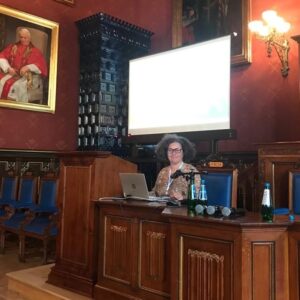By Beatrice Fracchiolla, University of Lorraine

The 6th General Conference of the International Language and Law Association (ILLA) took place recently at Jagiellonian University in Kraków recently. This worldwide network of linguists and lawyers works on the language matrix of law. In that framework, language is not simply seen as a subject in the legal context or an object of forensic analysis, but as the central medium of modern constitutional states, as the mediator of social conflicts and the core of legal methodology.
The 6th ILLA General Conference brought into focus new discursive practices in the dissemination of legal knowledge both within the expert community (legal-legal communication) and in communication with the outside world (legal-lay communication). It aimed to examine local, national and global dimensions of legal knowledge dissemination, explaining the role of communicative processes which, on the one hand, are rooted in legal tradition and, on the other, are subject to change as a result of the ongoing globalization, democratization and digitization of specialised communication.
Below is a paper delivered by Beatrice Fracchiolla, University of Lorraine entitled “When Law Deals with Gender”. The main purpose of this presentation is to discuss gender-oriented laws as they are, although they were generally voted to bring more equality forward. Laws appear as written enunciations of a variety of discourses that preexist, which are discussed throughout “law projects”, which sometimes get fragmented through different laws (or “sub” laws of a specific law, “marriage for all”, is a sub-law of the marriage general law, in France, which addresses only same-sex people.
In this context, it seems that the more specific a law tends to be, the more it tends to lead to feelings of violence, discrimination and prejudice in its interpretations in everyday life. This leads us to reflect on how laws paradoxically aim at opening up on more equality of rights and, at the same time, how their interpretation can lead to more discrimination, prejudice and violence felt by the people than what the law intended to be voted for.
In some French laws, as in some UK common laws, there sometimes seems to be specific implicit gendered-oriented discourses about women, as mothers, and wives, which tends to rule their rights on their bodies –abortion rights for instance. Also, to leave an “open space” for a hypothetical father to come and declare himself seems to be a leitmotiv in the way laws are written which seems to prevail in most countries worldwide. On the contrary, punishing a fleeing father to be from his responsibilities doesn’t seem to have yet been considered important by the laws in the same way/proportions.
Based on biological reasons and children’s protection laws seem to generally get more oriented towards the protection of men’s rights over their child (opened recognition over time) than, for example, women from getting pregnant and just having no father staying for their kids. This difference of treatment, although founded on what seems to be biological reasons, appears as an inequity of the way laws deal with gendered role repartitions, and probably also with the definition of what being a “parent” means.
I will mainly take my examples from the French law of marriage for all. My examples are taken from a corpus of 30 interviews with lesbian mothers who had to get married in order to adopt their spouse’s child(ren), although they actually had to be together in the first place to actually be able to conceive the child – so that, in fact, they need to get married to adopt their own child(ren)- but not in all circumstances. It depends on the method of conception. The method followed has been to record interviews, transcribe them, and analyse them from an enunciative point of view, as well as with a statistical textual analysis tool Lexico3, in order to point the recurrencies. Comparisons with other countries will be taken from fieldwork, interviews, and readings gathered in Oxford and Pondicherry, India, in 2022. The theoretical frame is more especially the legal consciousness studies.
References
Brunet, L. (2015). Les atermoiements du droit français dans la reconnaissance des familles
formées par des couples de femmes, Enfances Familles Générations, 23, 91–89.
Descoutures, V., & Stambolis-Ruhstorfer, M. (in press). License required: French lesbian
parents confront the obligation to marry in order to establish kinship. International Social
Science Journal. Retrieved from: https://10.1111/issj.12241.. .hal-02916235.92
Fracchiolla, B. (2022). Ce que discriminer veut dire, FR/EN, Introduction, contributions de
Dieter Stein, Victoria Guillen Nieto, Julien Longhi, Arthur Joyeux, Mieke Vandenboucke &
Adam Wilson, Lucia Schmidt et Béatrice Fracchiolla, Revue Cognition Représentation et
Langage. Retrieved from: https://journals.openedition.org/corela/14499.
Pélisse, J. (2005). A-t-on conscience du droit? Autour des Legal Consciousness Studies.
Genèses, Sciences sociales et histoire, 2(59), 114–130.
Théry, I. (2016). Mariage et filiation. Éditions de l’EHESS
